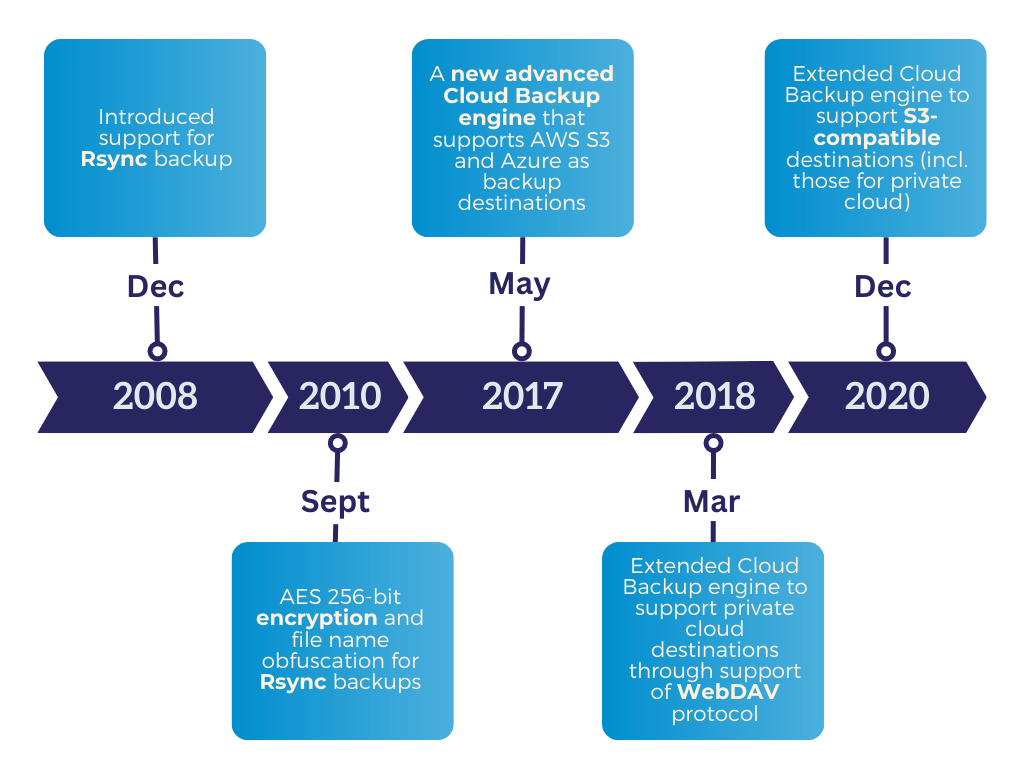The growth of cloud storage over the last 2 decades has seen the evolution of many cloud storage and data transmission technologies. Security, performance, and cost have been key requirements driving this evolution, and over time, the need to standardize has seen one technology win the race.
Amazon Simple Storage Service (S3) was launched in 2006 as the first large scale public cloud storage based with an object storage architecture. While other technologies including Rsync and WebDAV already existed, S3’s superior capabilities have seen its popularity rise. By 2016, the S3 API became the de-facto standard protocol for cloud storage and a plethora of S3-compatible object storage solutions have since emerged.
| As of November 2023, BackupAssist no longer provides technical support for Rsync and WebDAV and recommend the use of S3 compatible storage instead. IMPORTANT: As Rsync services receive security updates, it is expected that existing BackupAssist Classic Rsync jobs will no longer be compatible and stop working. |
Evolution of BackupAssist Classic Cloud Storage Technologies
BackupAssist Classic has been evolving with cloud storage technologies since 2008. Below is a timeline of this evolution:

With 15 years’ experience in private/DIY cloud backup, we have carefully observed the strengths and weaknesses in each of the different technologies, as well as the popularity, stability, and supportability of their relevant open-source implementations. This experience has led us to the conclusion that S3 compatible object storage solutions are the superior solution for private/DIY cloud backup.
S3-Compatible Storage vs Rsync and WebDAV
In the table below, we compare S3-compatible solutions to Rsync and WebDAV:
| Cloud Backup to Rsync | Cloud Backup to WebDAV | Cloud Backup to S3-Compatible | |
|---|---|---|---|
| Scalable (performs well with large data sets) | – | – | √ |
| Widely supported by cloud providers | √ | – | √ |
| Widely supported by storage device vendors | √ | √ | √ |
| Frequent revision and releases | – | – | √ |
| Efficient network utilization | √ | √ | √ |
| Efficient backup storage (incl. deduplication and compression of data) | – | √ | √ |
| Modern zero knowledge of encryption support | – | √ | √ |
| Backup storage in original file format | √ | – | – |
Scalability wise, because WebDAV is a file-based storage solution (rather than object-based), it requires significant memory when there is a large amount of data involved. As such, performance could suffer as data grows. Rsync, on the other hand, requires more processing on the server side to carry out data comparison, which also impacts performance as data grows.
The other important factor is how well the platform is supported and how well it has evolved over time. On this point, S3-compatible platforms are clearly better supported and more popular with most cloud storage providers (e.g. Wasabi, BackBlaze, DigitalOcean) and storage device vendors (e.g. NAS) supporting the protocol.
Conclusion
As a result of this understanding, at BackupAssist we strongly recommend that if you plan to implement your own private cloud backup solution, you should implement an S3 compatible object storage solution such as MinIO and many other solutions that are available today.
You can read more about our S3-compatible solutions here or visit our online help documentation for BackupAssist Classic and BackupAssist ER.





